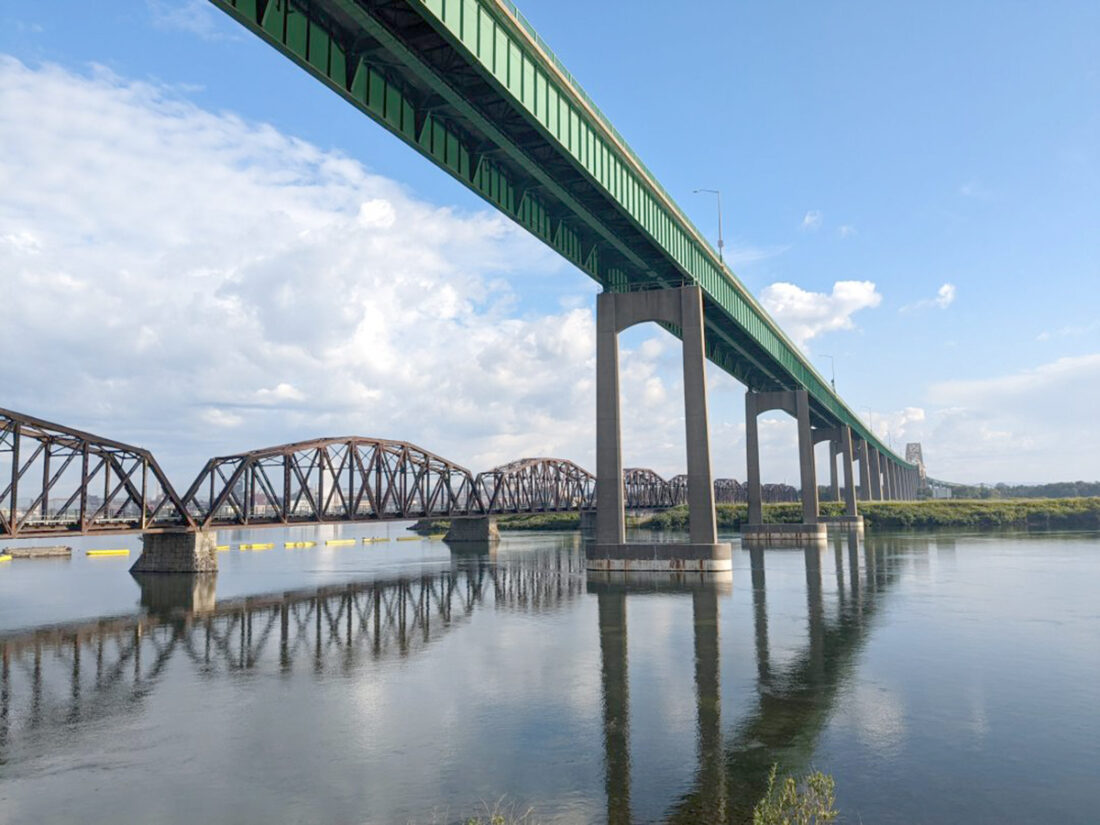Michigan sees fewer Canadian visitors this year, bridge traffic declines

The International Bridge connects Sault Ste. Marie, Ontario, and Sault Ste. Marie, Michigan. (Courtesy of Sault Ste. Marie International Bridge)
LANSING – So far this year, the United States has seen a large drop in Canadian visitors, and Michigan is no exception to the national trend.
Each month in 2025, the United States has seen less Canadian inbound traffic than the previous year, according to Statistics Canada. The number of Canadians visiting the United States by car last month was 34% lower than in August 2024.
Local businesses in Metro Detroit are feeling the absence of Canadian visitors, said Brett McWethy, the senior director of communications at Visit Detroit.
“We can confirm that tourism from Canada to Southeast Michigan is down in 2025 and has had a challenging impact on our local attractions,” he said.
McWethy said maintaining a positive relationship with Canada and welcoming Canadians to the United States is essential for the economic well-being of the region.
A survey earlier this year for the Association of Canadian Studies found that most Canadians now think the United States is unsafe to visit and they no longer feel welcome.
Reasons cited include increased scrutiny for people entering the county, higher U.S. tariffs on Canadian products and derisive rhetoric from President Donald Trump.
“America wants our land, our resources, our water, our country; these are not idle threats,” said Prime Minister Mark Carney in his election night victory speech. “President Trump is trying to break us so America can own us. That will never, ever happen.”
Studies by the World Travel and Tourism Council and Tourism Economics predict the United States will see a $25 to $29 billion loss due to lower international tourism this year.
In 2024, Canadians made up one-fourth of international visitors, according to the U.S. National Travel and Tourism Office.
Michigan has four land border crossings with Ontario.
The Ambassador Bridge between Detroit and Windsor had the second-greatest number of personal vehicle traffic among all the U.S.-Canada international bridges nationally last year. The Blue Water Bridge linking Port Huron with Point Edward, Ontario, ranked fourth for personal vehicle traffic in 2024, according to the U.S. Bureau of Transportation Statistics.
Data available from January through August shows a month-by-month decline in each bridge’s traffic.
So far, the International Bridge connecting Sault Ste. Marie, Michigan, and Sault Ste. Marie, Ontario, has seen a 24% decline in traffic compared to last year, and the Ambassador Bridge has seen a decline of about 15%.
The Detroit-Windsor Tunnel and Blue Water Bridge have experienced less dramatic declines at about a 2% decrease for both, according to the Bridge and Tunnel Operations Association.
Matthew Slotwinski, the chief executive officer of the Sarnia-Lambton Economic Partnership, said the decline at the Blue Water Bridge would be much higher if looking only at personal vehicle traffic rather than including commercial vehicles.
Political decisions and comments threatening Canadian sovereignty by the Trump administration, have dissuaded Canadians from coming into the U.S, he said.
“Comments about Canada becoming the 51st state have not fallen well on the Canadian public,” Slotwinski said. “Certainly people are proud of our country and are hesitant to contribute economically or physically in any way to a country that is perceived as threatening upon our sovereignty.”
Tariffs imposed and border security concerns are other significant reasons, he said.
“There’s been stories about individuals being harassed or alternatively facing potentially unreasonable circumstances at the Canada-U.S. border that they don’t want to expose themselves or their families to,” Slotwinski said.
Given that the two countries have had a centuries-long positive relationship, Trump’s rhetoric has shocked many Canadians, he said.
The biggest impact he sees locally in Port Edward is people no longer crossing the border for daily shopping needs in Port Huron, he said.
“People traditionally would have crossed the border for a case of beer, a tank of gas or to buy groceries at Meijer,” he said. “Right now, people aren’t doing that, and that’s a major contributor to (declining) cross-border traffic but also local economies.”
Tom Nemacheck, the executive director of the Upper Peninsula Travel and Recreation Association, said communities near the international crossings are more likely to see economic fallout from a drop in Canadian visitors than the central UP.
Canadian tourism to Michigan overall is undoubtedly down, but that trend isn’t observable in the UP because Canadians generally don’t represent a large percentage of visitors to the region in the first place, he said.
“It makes sense. Toronto is a long way away,” he said. “And the U.P. has a lot of similarity to Ontario as far as lakes and hills and beautiful areas along the Great Lakes.”
A place like Sault Ste. Marie, Michigan, where people go shopping, is a different story, he said.
Bridge traffic has decreased there for the first time since the bridge was built in 1962, he said, describing the trend as “sad.”
“It’s just remarkable to think that the bridge has increased traffic every year since 1962,” he said. “So, that’s an unbelievable trend to go the other way.”
———
Capital News Service is based at Michigan State University.






